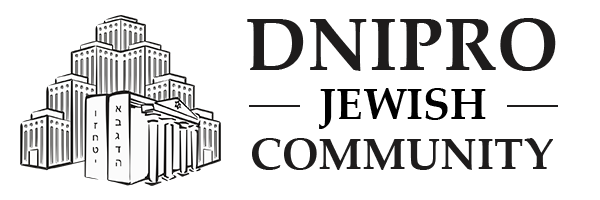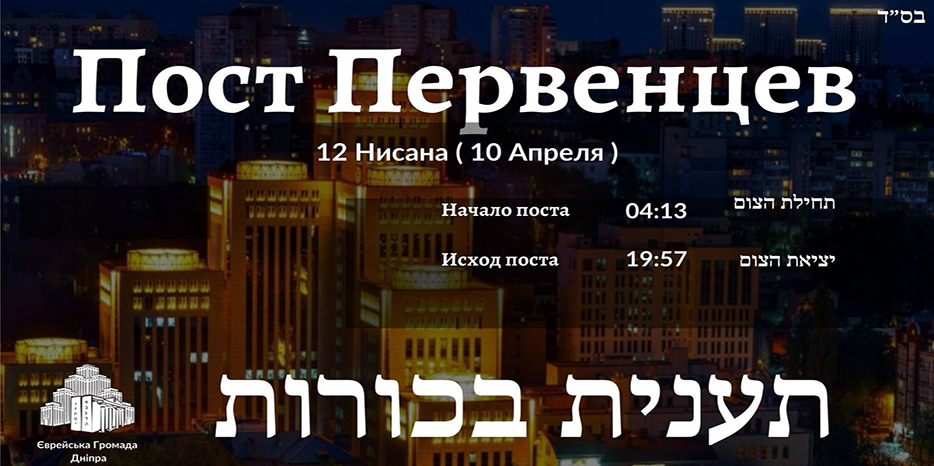Early in the morning on Thursday, April 10, the Fast of the Firstborn begins (in Dnipro, the start time is 4:13 AM). It lasts all day until 19:57.
Usually, every eve of Pesach, on the 14th of Nisan, all firstborns are required to fast. This year, since the eve of the holiday falls on Shabbat, the fast is postponed.
The Fast of the Firstborn has customs that vary among different communities. According to the customs accepted in the Dnipro community, those who fast are the firstborns, both from their mother and their father.
The Chassidus website provides information about the significance of the ‘Fast of the Firstborn’ and the customs associated with its observance in different communities.
In all communities of Israel, there has been a custom since ancient times whereby firstborns fast on the eve of Pesach in memory of the miracle that saved them from the plague that struck all the firstborns of Egypt. Generally speaking, this fast should be observed on the anniversary of the miracle, that is, on the 15th of Nisan, since the firstborns of Egypt were struck on the night of the 15th of Nisan. However, the 15th of Nisan is a festive day, the first day of Pesach, and fasting is not permitted on festivals. Additionally, it should be remembered that the firstborns of Israel in Egypt were saved because they submitted to the Almighty and acknowledged His authority over the entire world, while the Egyptians continued to insist that the world belonged to them until the very end. Therefore, the Fast of the Firstborn on the 14th of Nisan serves as a reminder of how the firstborns of Israel in Egypt humbled themselves before the Almighty on that day and acknowledged His authority—especially since anyone who afflicts their body through fasting humbles their heart before the Creator.
Different communities have various customs associated with this fast. According to one opinion, all firstborns should fast on this day—those who are firstborns from their father and those who are firstborns from their mother—both men and women. Moreover, if there are no firstborns in the family, the oldest member of the household should fast, for in Egypt, there was not a single house without a deceased, and if there were no firstborns, the head of the family would die. Therefore, there was no Jewish household that was not affected by the saving miracle that we commemorate with this fast. According to another opinion, only true firstborn males should fast. In most communities, the custom has developed that only firstborn males fast; however, a firstborn is considered any male who was born first to his mother, even if there was a miscarriage preceding his birth.
It is customary for the father (even if he is not a firstborn) to fast on behalf of his young firstborn son.
A firstborn father who fasts on behalf of his firstborn son fulfills the custom for both, and his fast is counted for two. However, there is an opinion that this is not sufficient, and in such a case, the child’s mother should also fast.
If a firstborn boy is born after midnight on the 14th of Nisan, he is not required to fast this year, as in Egypt, the children of Egyptians born after midnight on the 14th of Nisan did not die. There is an opinion that one should only fast for firstborn boys who are at least thirty days old before Pesach, as the fast of the firstborns, which is ultimately just a common custom, cannot be more general than the commandment of redeeming firstborns, which is directly mandated by the Torah and is fulfilled only after the child has reached thirty days.
If the eve of Pesach falls on a Saturday, the Fast of the Firstborn is moved to Thursday (but not to Friday, as it is generally not customary to move fasts to that day). However, if the eve of Pesach falls on a Friday, the fast is not moved. Nevertheless, there is an opinion that the Fast of the Firstborn is not moved at all—meaning that if the eve of Pesach falls on a Saturday, it is canceled.
There are also other exceptions that mitigate this fast: thus, despite the fast, the festive meals prescribed by law (seudat mitzvah) accompanying ceremonies such as circumcision or the completion of studying a Talmud tractate (seudat siyum) are not canceled. In later times, in many communities, it has become customary to hold a seudat siyum in synagogues immediately after the conclusion of the morning prayer, in which all the firstborns of the community participate. This way, they conclude the fast and can eat throughout the day.




